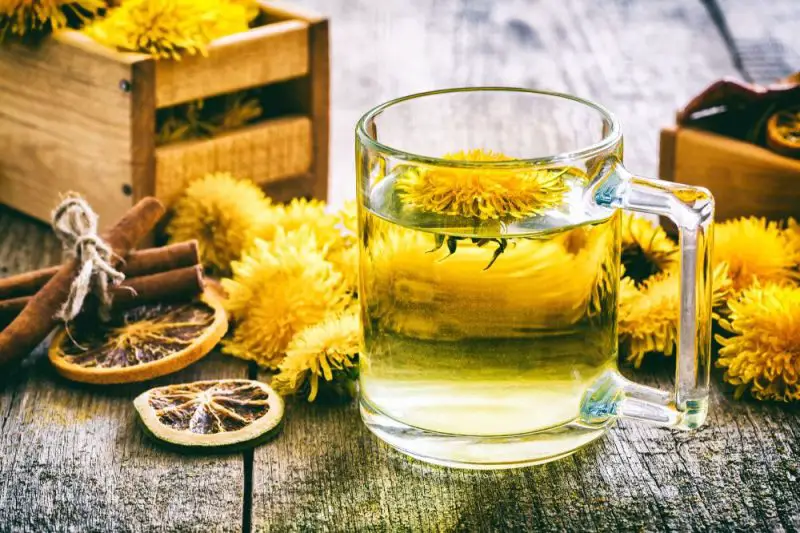Dandelions are often seen as simple garden weeds, yet they are nutritional powerhouses. Their leaves, flowers, and roots are packed with vitamins, minerals, and antioxidants. These natural compounds support various aspects of health, from liver function to immunity.
Many people overlook dandelions, but they offer surprising benefits for digestion, detoxification, heart health, and even blood sugar control. By understanding how to use them safely, you can transform this humble plant into a versatile ally for overall wellness.
Supports Liver Health

How Dandelion Benefits the Liver
Dandelion has long been used in traditional medicine to promote liver health. Its roots and leaves contain bioactive compounds that help detoxify the liver and protect liver cells from damage. Research suggests that these compounds may enhance bile production, supporting efficient digestion and nutrient absorption. By promoting bile flow, dandelion aids the breakdown of fats and facilitates the removal of toxins from the body.
Regular intake of dandelion root tea or standardized extracts may reduce oxidative stress in liver tissues. Oxidative stress is a common contributor to liver inflammation and damage caused by poor diet, alcohol, or environmental toxins. While dandelion offers gentle support, it is not a replacement for medical treatment in serious liver conditions. Individuals with liver disease should consult a healthcare professional before incorporating supplements or concentrated extracts.
Practical Tips for Liver Support
Dandelion root tea is the most effective way to promote liver health. Steep one to two teaspoons of dried root in hot water for 10–15 minutes. Drinking one to two cups daily may improve liver detoxification and bile production. For stronger results, combine dandelion root with milk thistle, another herb known for liver support. Drinking tea consistently in the morning or before meals helps maximize its effects.
Fresh dandelion leaves are a nutrient-rich addition to meals. Add them to salads, smoothies, or lightly sauté them with olive oil for a healthy side dish. These greens provide vitamins A, C, K, and essential minerals like iron and potassium, which support liver function and overall wellness. Gradually increase intake to allow your digestive system to adjust. Avoid consuming dandelion from areas exposed to pesticides. Using organically grown or foraged plants ensures maximum safety and nutrient content while supporting gentle, natural liver detoxification.
Improves Digestion
Dandelion as a Digestive Aid
Dandelion naturally stimulates digestion by promoting bile production and supporting gastrointestinal function. Its high fiber content aids regular bowel movements, reduces constipation, and promotes a healthy gut microbiome. By enhancing bile flow, dandelion improves the breakdown and absorption of fats and nutrients, reducing digestive discomfort and bloating. Research suggests that compounds in dandelion may protect the stomach lining from inflammation and oxidative stress, making it easier to digest heavier meals.
Regular use of dandelion tea or fresh leaves can encourage a balanced digestive system. Its mild diuretic effect helps remove excess water and toxins, indirectly supporting gut health. Incorporating dandelion into your diet can improve appetite, support nutrient absorption, and reduce occasional digestive discomfort. For best results, consume it consistently as part of a balanced diet while monitoring your body’s response.
How to Use for Digestion
Fresh dandelion leaves are versatile and easy to incorporate into meals. Add them to salads, sandwiches, or blended smoothies. Lightly sautéed leaves preserve nutrients while making them easier to digest. Including dandelion regularly supports bowel movements, reduces bloating, and provides dietary fiber for healthy gut function.
Dandelion root or leaf tea is particularly beneficial before or after meals. Steep the roots or leaves for 10–15 minutes, and drink once or twice daily. For enhanced effects, combine tea with other digestive herbs like ginger, peppermint, or fennel. Gradually increase intake to allow your digestive system to adjust and avoid minor side effects, such as mild gas or loose stools. Consistent consumption promotes overall gut health and nutrient absorption while supporting natural detoxification processes.
Boosts Immune System
Dandelion’s Antioxidant Properties
Dandelions are rich in antioxidants, which protect cells from free radical damage and support immune function. Vitamins A and C in dandelion leaves are essential for maintaining a strong immune response, while polyphenols and flavonoids provide additional protection against inflammation and infection. These compounds strengthen the body’s natural defenses, helping prevent seasonal illnesses and chronic oxidative stress.
Consistent consumption of dandelion may enhance immune resilience. Its bioactive compounds support healthy white blood cell activity and reduce systemic inflammation. Regular use of dandelion in the diet, whether as fresh greens, tea, or supplements, can help the body respond effectively to minor infections while maintaining overall wellness.
Practical Tips for Immune Support
Fresh dandelion greens are an excellent source of immune-boosting vitamins A and C. Add them to salads, wraps, smoothies, or lightly cooked dishes to enhance antioxidant intake. These nutrients strengthen white blood cells, help fight infection, and reduce inflammation. Regular inclusion in your diet supports resilience during seasonal illnesses.
Dandelion tea or high-quality supplements provide convenient ways to increase antioxidant intake. Steep leaves or flowers for tea, or take capsules/tinctures according to recommended doses. Choose organic products free from pesticides or contaminants. Pair dandelion with other nutrient-dense foods like berries, leafy greens, and citrus fruits to maximize immune support. Drinking tea consistently and consuming fresh leaves daily helps protect cells from oxidative damage and supports overall wellness.
Supports Heart Health
How Dandelion Promotes Cardiovascular Wellness
Dandelion contains significant potassium levels, which help regulate blood pressure and support proper heart function. Its antioxidants prevent oxidative damage to arteries, reducing the risk of cardiovascular disease. Studies suggest that dandelion may also help lower cholesterol levels, promoting healthy blood circulation and reducing arterial plaque formation. These combined effects contribute to improved cardiovascular wellness and lower long-term heart risks.
Regular inclusion of dandelion in the diet can complement lifestyle measures such as balanced nutrition and regular exercise. The antioxidants in dandelion combat free radicals, which otherwise damage blood vessels and increase inflammation. Maintaining arterial health, proper circulation, and balanced blood pressure can be naturally supported with consistent use of this plant.
Tips for Heart Health
Dandelion leaves are a natural source of potassium and fiber, both critical for maintaining healthy blood pressure. Add fresh leaves to salads, sandwiches, or smoothies to support cardiovascular function. Lightly sautéed leaves can also be used as a nutrient-rich side dish. Including them regularly contributes to arterial health and helps maintain healthy cholesterol levels.
Drinking dandelion tea daily provides antioxidants that reduce oxidative stress in blood vessels and improve circulation. For added benefits, pair dandelion with a heart-healthy diet rich in whole grains, nuts, and fruits. Those taking blood pressure or diuretic medications should consult a healthcare provider before large-scale consumption. Using dandelion consistently as part of a balanced lifestyle can enhance heart health naturally, reducing long-term cardiovascular risks.
Supports Bone Health
Nutrients in Dandelion for Bones
Dandelion is rich in calcium, magnesium, and vitamin K, all essential for maintaining strong bones. Vitamin K supports calcium absorption and bone mineralization, while magnesium contributes to bone density and structural integrity. Regular intake of dandelion can help reduce the risk of osteoporosis and other bone-related conditions.
In addition to minerals, dandelion contains trace elements such as phosphorus and potassium, which further support skeletal health. Consuming dandelion as part of a balanced diet ensures that the body receives nutrients necessary for healthy bone growth and maintenance. Combining dandelion with weight-bearing exercise enhances its benefits.
How to Include Dandelion for Bone Health
Fresh dandelion leaves are rich in calcium, magnesium, and vitamin K, making them excellent for supporting strong bones. Add them to salads, sandwiches, or smoothies to boost daily nutrient intake. Lightly sautéed leaves preserve minerals while adding flavor to meals. Regular inclusion ensures your body receives essential nutrients for bone mineralization and density, reducing the risk of osteoporosis over time.
Dandelion tea or powdered supplements provide another convenient method to support skeletal health. When using supplements, choose high-quality, pesticide-free products and follow recommended dosages. Pairing dandelion with other calcium-rich foods like leafy greens, dairy, or fortified plant-based alternatives enhances its bone-supporting effects. Combined with regular weight-bearing exercise, dandelion helps maintain long-term bone strength, supports proper mineral balance, and contributes to overall skeletal wellness.
Aids in Detoxification
Dandelion as a Natural Detox
Dandelion supports liver and kidney function, helping the body remove toxins effectively. Its mild diuretic effect increases urine production, promoting the elimination of excess water and metabolic waste. These actions reduce bloating and support kidney efficiency.
Antioxidants in dandelion neutralize harmful free radicals, protecting cells from oxidative stress. Regular use encourages healthy detoxification pathways, helping maintain metabolic balance and overall wellness. Dandelion’s bioactive compounds also aid in cleansing the digestive system, complementing its effects on the liver and kidneys.
Practical Detox Tips
Dandelion tea is a simple and effective way to promote natural detoxification. Steep dried roots or leaves in hot water for 10–15 minutes and drink daily. This supports liver and kidney function, helping the body remove toxins efficiently. The mild diuretic effect aids in flushing excess water and metabolic waste, reducing bloating and supporting organ efficiency.
Incorporating fresh dandelion leaves into salads, smoothies, or lightly cooked dishes adds vitamins, minerals, and antioxidants that further support detox pathways. For best results, combine dandelion with a diet rich in fruits, vegetables, and fiber. Avoid relying solely on dandelion for cleansing, as a holistic approach including hydration, balanced nutrition, and regular physical activity is essential. Consistent use enhances energy, supports metabolic health, and maintains overall wellness.
May Support Blood Sugar Control
Dandelion and Glucose Regulation
Dandelion may help regulate blood sugar levels naturally. Its bioactive compounds can improve insulin sensitivity and support glucose metabolism. Additionally, the fiber in dandelion leaves slows carbohydrate absorption, reducing blood sugar spikes after meals.
Studies suggest that regular consumption may contribute to stable energy levels and better glycemic control. While promising, dandelion is best used as a complementary approach alongside a balanced diet and, if needed, prescribed medication. Monitoring blood sugar is essential when introducing dandelion into your routine.
Tips for Blood Sugar Support
Fresh dandelion leaves can help regulate blood sugar naturally due to their fiber content, which slows carbohydrate absorption and reduces glucose spikes. Add leaves to salads, smoothies, or lightly cooked dishes to incorporate them into your daily diet. Gradually increasing intake allows the body to adjust and supports consistent glycemic control.
Dandelion tea or high-quality supplements offer additional support for maintaining stable blood sugar levels. Steep roots or leaves for tea, or take capsules according to recommended doses. Combining dandelion with a balanced diet, low-glycemic foods, and regular exercise enhances its effects. Always monitor blood sugar if taking medication, as dandelion may complement, but not replace, prescribed treatment. Regular use supports energy levels, metabolism, and overall blood sugar balance naturally.
How to Use Dandelion Safely
Fresh Leaves and Greens
Fresh dandelion leaves are highly nutritious and versatile. They can be eaten raw in salads, blended into smoothies, or lightly sautéed for a warm dish. These leaves are packed with vitamins A, C, and K, as well as essential minerals such as calcium, magnesium, and iron, all of which support overall health.
When introducing fresh dandelion leaves into your diet, start gradually. Eating too much at once may cause mild digestive upset, such as gas or loose stools. Begin with small portions, observe how your body responds, and slowly increase intake. Using organically grown or foraged dandelion ensures you avoid harmful pesticides or contaminants, maximizing the nutritional benefits safely.
Dandelion Tea
Dandelion tea is a convenient and effective way to gain the plant’s health benefits. Steep dried leaves or roots in hot water for 10–15 minutes. Drinking one or two cups daily may support liver function, aid digestion, boost immunity, and provide antioxidant protection.
Tea made from the roots is particularly effective for liver and bile support, while leaf tea is more suitable for general detoxification and nutrient intake. You can enjoy it hot or cold, and combining it with other herbal ingredients like ginger or peppermint may enhance flavor and digestive benefits.
Supplements
Dandelion is also available as capsules, powders, or tinctures, offering a concentrated and convenient option. When choosing supplements, select high-quality, pesticide-free products to ensure safety and efficacy.
Follow the recommended dosages on the label and consult a healthcare provider before starting supplementation, especially if you have liver or kidney conditions, are pregnant, breastfeeding, or taking medications. Supplements should complement, not replace, a balanced diet and a healthy lifestyle for optimal results.
FAQ About 7 Benefits of Dandelion
How often should I consume dandelion for health benefits?
Daily consumption is safe for most people when done in moderation. Fresh leaves can be added to salads, smoothies, or sautéed. Tea made from leaves or roots can be enjoyed once or twice a day. Supplements, such as capsules or tinctures, should follow recommended dosages. Consistent, moderate use ensures benefits without digestive upset or overconsumption of certain nutrients.
Can dandelion interact with medications?
Yes, dandelion may interact with diuretics, blood thinners, or diabetes medications. Its mild diuretic effect can enhance water loss from the body, and its vitamin K content may affect blood clotting. People taking prescription drugs should consult a healthcare provider before using dandelion supplements or consuming large quantities. This ensures safety and avoids unwanted side effects.
Is dandelion safe for children and pregnant women?
Dandelion is generally safe when consumed as food, such as leaves in salads or teas in moderation. However, pregnant or breastfeeding women, and young children, should consult a doctor before using concentrated extracts or supplements. This precaution helps prevent allergies, digestive upset, or interactions with medications.
How should I prepare dandelion for maximum benefits?
Fresh leaves retain vitamins and minerals when eaten raw. Steeping dried roots and leaves in hot water produces antioxidant-rich tea. Lightly cooking leaves preserves nutrients while making them easier to digest. Supplements provide convenience but ensure high-quality, pesticide-free sources. Choosing preparation based on your health goals maximizes benefits.
Can dandelion help with specific health conditions?
Dandelion may support liver function, improve digestion, boost immunity, aid detoxification, and help regulate blood sugar. It also provides antioxidants for heart and bone health. While promising, dandelion should complement, not replace, medical treatment. Regular use as part of a balanced diet supports overall wellness and preventive health naturally.
Conclusion
Dandelion is far more than a common weed; it is a versatile plant packed with health benefits. From supporting liver function and boosting digestion to enhancing immunity, heart health, bone strength, detoxification, and blood sugar control, it offers a natural way to improve overall wellness. Incorporating fresh leaves, tea, or high-quality supplements into your daily routine can harness these powerful benefits. Always use dandelion safely and consult a healthcare professional if needed, ensuring you enjoy its full potential for long-term health and vitality.






